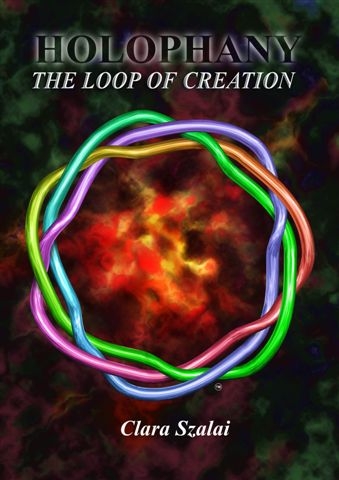Soon to be published:
Holophany, the Loop of Creation
|
People believe that the continuance of what they know to be their reality is certain, but this ‘knowing' precludes observation and interaction with changing conditions. So many misfortunes in history could have been prevented if the illusion of certainty had been eschewed for uncertainty. Furthermore, the greatest discoveries in history - whether geographical or scientific - were made by people who chose the adventure of facing uncertainty over what was already known. For what is terra incognita if not the very realm of uncertainty? Perhaps, understanding the nature of uncertainty, of the
In order to accomplish such a feat, to live comfortably in uncertainty, we need tools to change our viewpoint. This does not amount to exchanging one belief system for another, one dogma for another, but exploring the mechanism that creates assumptions and Holophany, The Loop of Creation deals with these questions, and in the process, challenges the reader to embark on the adventure of rational thinking to the extreme of experience, where psychic experience goes hand in hand with rational thinking. The book takes the reader on an epic adventure to the frontiers of the mind, transforming him into a neophyte of the mystery of existence. To achieve betterment, we need to let go of our attachment to the defined state of affairs, and instead, we need to focus on the process of defining, and indeed, on how these defined states were generated. But letting go of our attachments leaves us in a void, a world devoid of dogmas, truth, certainty in how things are or should be. This is a world of becoming instead of being, wherein there is nothing fixed to relate to, no anchor. This would be a most frightening experience for most, unless there was a roadmap to this chaos. There is.
Holophany and the logical structure of the loop of creation, guide us through this maze, permitting us to create our lives instead of being thrown into the whirlpool of existence. This logical structure empowers us with responsibility for our condition, and if our condition is less than desirable, the logical structure also provides us with the means by which we can change it. Instead of demanding more laws that sanction navigation in the seas of right, Holophany provides tools to increase personal and global responsibility by augmenting response-ability: the ability to respond to others' needs and distress. Responsibility, and indeed, response-ability, stipulates
In spite of our scientific and technological advances, the belief that knowledge will solve all our problems has been shattered on the cliffs of reality. Holophany, The Loop of Creation re-examines those fundamental conjectures and hidden assumptions that led to modern science and our present conception and perception of reality. Descartes' cogito ergo sum launched a new epoch of pragmatical science by engendering the dualism separating the mind from the body. This distinction allowed science to evolve based upon causal laws, whereas experience, the immeasurable, remained within the realm of the spirit. The division worked for mechanistic science, but the fact that science is unable to include all aspects of existence (such as Why is science unable to cope with the notion of consciousness and God? In its present form, science deals with measurable entities and has not yet found a way to quantify the spirit. A priori, it never will, because if God was quantifiable, it would not be God. This simple fact alone suggests that science is incomplete in its formidable attempt to express everything in well defined terms. It follows that maybe science is wrong in assuming that only well quantifiable entities are workable tools. Gödel, the famous mathematician and logician, proved on a small scale that the aspiration to a totally defined system is incomplete and leads to paradoxes. He did not provide an alternative. Holophany is the alternative, linking consciousness with the rest of existence through the endemic paradoxes that become paramountly important when utilized as a creative, dynamic structure rather than an obstruction, a dead-end. This philosophy then assumes an imaginary Descartes, who, instead of saying, I think, therefore I exist, would have said, I experience, therefore I am.
The new paradigm presented in Holophany, The Loop of Creation entails novel methods to approach the greatest enigmas facing humanity, such as how something can be created from nothing and the structure of perception and experience. It broaches the biggest questions humans ask as well (like: What is life?), and much more. The material is provocative: not in what it states, but what it implies. Since this philosophy does not bring forth any dogma or truth, dealing only with the nature of the act of perception and creativity, and since its argumentation is logical Entertaining, and at times funny, this inspired material provides the tools of creativity that could change lives. These tools are so surprisingly new because they emphasize the structure of our thinking instead of its contents. When we know how we think, we can change what we think, feel and believe. Holophany, The Loop of Creation is a true adventure into the unknown. Read Table of Contents and Chapter 1 |
 What if, instead of an easy three steps to self-betterment, instead of answers, dogmas, generalizations and stereotypes, we simply looked and observed? What if, instead of yearning to feel sheltered within our knowledge of the world, we refrained from the neat labeling and categorization of everything we encountered? What if, instead of looking for security, we embraced uncertainty and lived comfortably in it?
What if, instead of an easy three steps to self-betterment, instead of answers, dogmas, generalizations and stereotypes, we simply looked and observed? What if, instead of yearning to feel sheltered within our knowledge of the world, we refrained from the neat labeling and categorization of everything we encountered? What if, instead of looking for security, we embraced uncertainty and lived comfortably in it? "Indefinite"
"Indefinite"